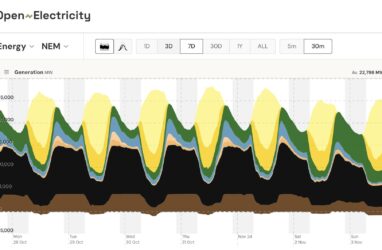Feed aggregator
New solar-battery at shuttered BHP nickel mine to be repurposed to power Kalgoorlie
The post New solar-battery at shuttered BHP nickel mine to be repurposed to power Kalgoorlie appeared first on RenewEconomy.
Queensland premier says costs of dumped Pioneer pumped hydro project blew out to $37 billion
The post Queensland premier says costs of dumped Pioneer pumped hydro project blew out to $37 billion appeared first on RenewEconomy.
Redesigning payments for forest conservation could boost cost-effectiveness, researchers find
US non-profit announces funding programme to advance field research on ERW
Exploring the extraordinary potential (and avoiding the pitfalls) of your local Buy Nothing group
Thousands of blue-clad protesters join London march for clean water
More than 130 organisations take part in protest demanding government action over country’s sewage crisis
Thousands of blue-clad protesters have told the government to “stop poisoning Britain’s water” as they marched through London calling for action on the country’s contaminated coastal waters and rivers.
A coalition of more than 130 nature, environmental and water-sport organisations called supporters out on to the streets of the capital on Sunday afternoon, aiming to create the country’s biggest ever protest over water.
Continue reading...Labour MPs push back against anti-pylon lobbying despite local opposition
Letter by 61 Labour MPs supports ‘cheapest and most pragmatic’ plan for new electricity infrastructure
More than 60 Labour MPs have formed a bloc to push back against anti-pylon lobbying by Conservative and Green MPs, saying they back plans to build the pylons despite local opposition in several areas.
MPs, particularly in rural areas, have come under mounting pressure from anti-pylon activists to oppose the infrastructure. The Tories found themselves forced to commit to hold a “rapid review” of overhead pylons in their July manifesto.
Continue reading...Argentine carbon markets bill centres national registry, empowers regulator
Panama imposes moratorium on forest carbon projects
My mother nursed a life-affirming 25-year grudge. Hard as I try, I don’t have the attention span | Zoe Williams
It turns out long-held resentments exist even in the animal kingdom. Does that mean they hold an evolutionary advantage?
The best thing that happened to me during the whole of the pandemic was a story on the internet. An Oregon resident, furloughed, saw on a daytime nature documentary that, if you fed crows, they would bring you small gifts. Curious, they tried it, and were delighted to find themselves in effective possession of a 15-strong crow family – but then things took a dark turn. The crows became an army, fiercely protective of their leader’s property. If neighbours came near, the crows would dive-bomb them. “To be clear,” the person wrote on Reddit, “they’re not aggressive 100% of the time. If just the neighbours are out [on their own porch], they are friendly, normal crows. They only get aggressive when someone gets close to me or my property.”
It’s such a lovely phrase, “friendly, normal crows”; it’s just a pity that it’s an oxymoron. Crows are the most prodigious grudge-holders, which a professor of wildlife at Washington University, John Marzluff, discovered by capturing seven of the birds while wearing an ogre mask in 2006. A full 17 years later, crows were still regularly attacking him. Even if you were to query the ethics of his original experiment, you’d have to admit that he paid a high price. How such a thing is possible when the lifespan of a crow is only 12 years is this: not only can they hold a grudge, they can also pass it on to one another. Originally, even birds that witnessed the ogre-trap attacked Marzluff, then over time they transmitted the hostility to their offspring, creating a multigenerational grudge.
Zoe Williams is a Guardian columnist
Continue reading...Australia’s best performing wind and solar farms in October
The post Australia’s best performing wind and solar farms in October appeared first on RenewEconomy.
‘We didn’t realise how hard it is’: small farmers in Europe struggle to get by
Brutal economic situation has inflicted misery on farmers who struggle to turn a profit and forced some to look for alternative streams of revenue
When Coen van den Bighelaar first spoke to school friends about taking over their parents’ dairy farms, he was the only one of the four to voice serious doubts. Fresh out of university, he was making more money in a comfortable office than his father did toiling for twice as long in the field.
But six years later, Bighelaar has followed in his parents’ footsteps, while his friends’ enthusiasm has waned. One quit farming to take a job in logistics. Another opened a daycare centre to supplement the income from selling milk. A third is thinking about buying land and moving to Canada.
Continue reading...Revealed: billionaires are ‘ultimate beneficiaries’ linked to €3bn of EU farming subsidies
Thousands of small farms have closed according to analysis of official but opaque data from EU member states
The European Union gave generous farming subsidies to the companies of more than a dozen billionaires between 2018 and 2021, the Guardian can reveal, including companies owned by the former Czech prime minister Andrej Babiš and the British businessman Sir James Dyson.
Billionaires were “ultimate beneficiaries” linked to €3.3bn (£2.76bn) of EU farming handouts over the four-year period even as thousands of small farms were closed down, according to the analysis of official but opaque data from EU member states.
Continue reading...Developers quietly shed solar generation to focus on battery only projects
The post Developers quietly shed solar generation to focus on battery only projects appeared first on RenewEconomy.
Australia reaches record monthly renewable share of 47.4 per cent
The post Australia reaches record monthly renewable share of 47.4 per cent appeared first on RenewEconomy.
William returns to 'special place' Africa for prize awards
COP16: UN biodiversity talks cut short amid delegate departures, but scores successes
Politicians not ambitious enough to save nature, say scientists
Politicians not ambitious enough to save nature, say scientists
Robot retrieves radioactive fuel sample from Fukushima nuclear reactor site
Plant’s owners hope analysis of tiny sample will help to establish how to safely decommission facility
A piece of the radioactive fuel left from the meltdown of Japan’s tsunami-hit Fukushima Daiichi nuclear power plant has been retrieved from the site using a remote-controlled robot.
Investigators used the robot’s fishing-rod-like arm to clip and collect a tiny piece of radioactive material from one of the plant’s three damaged reactors – the first time such a feat has been achieved. Should it prove suitable for testing, scientists hope the sample will yield information that will help determine how to decommission the plant.
Continue reading...







